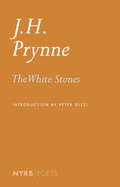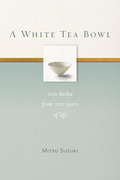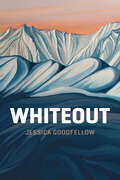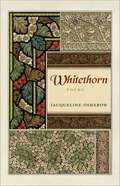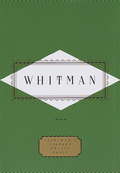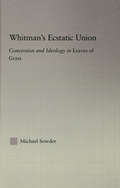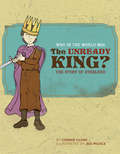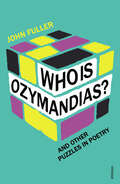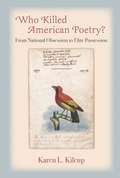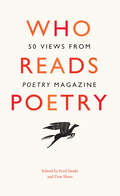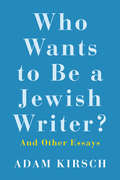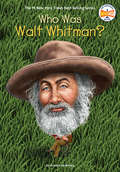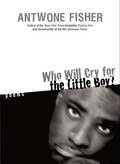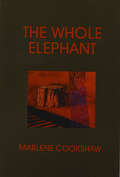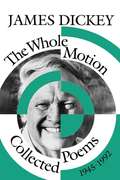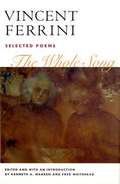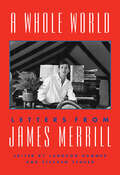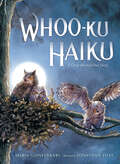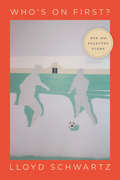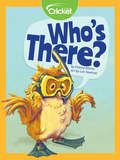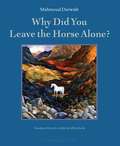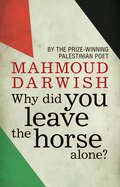- Table View
- List View
The White Stones
by J. H. Prynne Peter GizziJ. H. Prynne is Britain's leading late-modernist poet. His work, as it has emerged since the 1960s, when he was close to Charles Olson and Edward Dorn, is marked by a remarkable combination of lyricism and abstraction, at once austere and playful. The White Stones is a book that is central to Prynne's career and poetics, and it constitutes an ideal introduction to the achievement and vision of a legendary but in America still little-known contemporary master.
A White Tea Bowl
by Mitsu Suzuki Kate McCandlessA White Tea Bowl is a selection of 100 haiku written by Mitsu Suzuki, the widow of Shunryu Suzuki Roshi, and published in celebration of her 100th birthday. The compelling introduction by Zen priest Norman Fischer describes the profound impact on her life and work of war in Japan and social upheaval in America.Part I: 100 Haiku presents a kaleidoscope of poems by Mitsu Suzuki that touch all aspects of her being: her dedication to the Buddha way, the loneliness of a widow's life, her generational role as "Candy Auntie," her sensitive attunement to nature, and her moments of insight into the dharma. The more you read these haiku, the more their wisdom will emerge.Part II: Pickles and Tea contains reminiscences and anecdotes about Mitsu Suzuki by those who lived and studied with her at the San Francisco Zen Center; often these meetings took place in Mitsu's kitchen where she provided countless cups of tea, cookies, and homemade pickles as well as sage advice.
White Whispers: Selected Poems of Salabega
by Niranjan MohantyThe Book Is An Attempt To Bring To Limelight The Hidden, Unexplored Richness And Sophistication Of A 17Th Century Oriya Devotional Poet Whose Intense Piety Coupled With The Metaphoric Interiority Of The Medium Creates A Unique Kind Of Poetic Art.
Whiteout (The Alaska Literary Series)
by Jessica GoodfellowWhen she was a toddler, Jessica Goodfellow’s twenty-two-year-old uncle, along with six other climbers from the 1967 Wilcox Expedition to Denali, was lost in an unprecedented ten-day storm blasting winds of up to three-hundred miles per hour. Just as North America’s highest peak is so massive that it has its own distinct weather system—changeable and perilous, subject to sudden whiteout conditions—a family whose loved one is irretrievably lost has a grief so blinding and vast that it also creates its own capricious internal weather, one that lasts for generations. Whiteout is Goodfellow’s account of growing up in this unnavigable and often unspoken-of climate of bereavement. Although her poems begin with a missing body, they are not an elegy. Instead, Goodfellow struggles with the absence of cultural ritual for the uncontainable loss of a beloved one whose body is never recovered and whose final story is unknowable. There is no solace here, no possible reconciliation. Instead, Whiteout is a defiant gaze into a storm that engulfs both the wildness of Alaska and of familial mourning.
Whitethorn: Poems (A History of the South)
by Jacqueline OsherowIn "Poem for Jenne," which opens Jacqueline Osherow's ambitious and challenging newcollection, a neighbor has planted larkspur and delphinium in the poet's yard and is tending them hoping to bring color and light into a household stricken by personal tragedy. As the bright blue, star-shaped flowers bloom for a second time, the poet writes, "earth's reaching for her heavens, I for words / or any chink of rapture I can claim." The pervasive theme, in this poem and throughout Whitethorn, is that human suffering may be irremediable, yet in nature and language one may find a key to unlock the mysteries of sorrow.Osherow searches for that cipher by exploring a range of suffering, from the personal to the historical and cultural. In the poem "Orders of Infinity" she visits Treblinka and, in her inability to count the stones or quantify the real loss of the Holocaust, ponders the impossibility of imagining the unborn generations of the victims' descendants, an infinity of lives not lived, "undreamed daydreams, mute conversations, ungratified indulgences, failed hints..."In Whitethorn, a book of enormous scope and emotional intelligence, Osherow unflinchingly examines the pain of her own personal history and courageously probes the greater mystery of evil and suffering in the world.
Whitman: Poems
by Walt WhitmanThe Everyman's Library Pocket Poets hardcover series is popular for its compact size and reasonable price which does not compromise content. Poems: Whitman contains forty-two of the American master's poems, including "Crossing Brooklyn Ferry," "Song of Myself," "I Hear America Singing," "Halcyon Days," and an index of first lines.
Whitman's Ecstatic Union: Conversion and Ideology in Leaves of Grass (Studies in Major Literary Authors #38)
by Michael SowderFirst Published in 2005. Routledge is an imprint of Taylor & Francis, an informa company.
Who in the World Was The Unready King?: The Story of Ethelred (Who in the World)
by Jed Mickle Connie ClarkDiscover the intriguing story of Ethelred the Unready in this junior-level biography from Peace Hill Press. Ethelred's mother stood behind him. The archbishop smeared holy oil on Ethelred's shoulders and hands. He gave Ethelred a heavy sword and placed a gold crown on his head. The crown was too big--it fell over his eyes, and Ethelred almost dropped the sword on the archbishop's foot. How did Ethelred become king when he was only ten years old? Outstanding illustrations from Jed Mickle complement the fabulous story, giving second-grade readers insight into the life of this influential figure. About the series: The classical curriculum introduces even the youngest student to the pleasures of true learning. Elementary students learn history not through predigested textbooks with multiple-choice answers, but through reading the stories of history. Unfortunately, biographies of great men and women of the past are almost all written for older students, limiting the ability of young students to explore history through reading. Libraries are crammed with biographies written for high school students and adults--while beginning readers are provided with a shelf full of junior-level books about football players, NASCAR drivers, and movie stars. Now, Peace Hill Press puts real history back into the grasp of the youngest historians with the Who in the World Biography Series. The first entries in the series provide young readers and their parents and teachers with biographies of great men and women of the Middle Ages. Designed to be used as part of The Story of the World curriculum, these biographies give beginning historians in grades 2-4 a chance to explore beyond the textbook. An audio version is also available separately.
Who Is Ozymandias?: And other Puzzles in Poetry
by John FullerPart of the pleasure of poetry is unravelling the mysteries and difficulties it contains and solving the puzzles that lie within. Who, for instance, is Ozymandias? What is the Snark? Who is the Emperor of Ice-Cream? Or indeed, who is 'you' in a poem? In this perceptive and playful new book, acclaimed poet John Fuller looks at some of our greatest poems and considers the number of individual puzzles at their heart, casting light on how we should approach these conundrums as readers. From riddling to double entendres, mysterious titles to red herrings, Fuller unpicks the puzzles in works that range from Browning to Bishop, Empson to Eliot, Shelley to Stevens, to help us reach the rewards and revelations that lie at the centre of some of our best-loved poems.
Who Killed American Poetry?: From National Obsession to Elite Possession
by Karen L. KilcupThroughout the 19th century, American poetry was a profoundly populist literary form. It circulated in New England magazines and Southern newspapers; it was read aloud in taverns, homes, and schools across the country. Antebellum reviewers envisioned poetry as the touchstone democratic genre, and their Civil War–era counterparts celebrated its motivating power, singing poems on battlefields. Following the war, however, as criticism grew more professionalized and American literature emerged as an academic subject, reviewers increasingly elevated difficult, dispassionate writing and elite readers over their supposedly common counterparts, thereby separating “authentic” poetry for intellectuals from “popular” poetry for everyone else.\ Conceptually and methodologically unique among studies of 19th-century American poetry, Who Killed American Poetry? not only charts changing attitudes toward American poetry, but also applies these ideas to the work of representative individual poets. Closely analyzing hundreds of reviews and critical essays, Karen L. Kilcup tracks the century’s developing aesthetic standards and highlights the different criteria reviewers used to assess poetry based on poets’ class, gender, ethnicity, and location. She shows that, as early as the 1820s, critics began to marginalize some kinds of emotional American poetry, a shift many scholars have attributed primarily to the late-century emergence of affectively restrained modernist ideals. Mapping this literary critical history enables us to more readily apprehend poetry’s status in American culture—both in the past and present—and encourages us to scrutinize the standards of academic criticism that underwrite contemporary aesthetics and continue to constrain poetry’s appeal. Who American Killed Poetry? enlarges our understanding of American culture over the past two hundred years and will interest scholars in literary studies, historical poetics, American studies, gender studies, canon criticism, genre studies, the history of criticism, and affect studies. It will also appeal to poetry readers and those who enjoy reading about American cultural history.
Who Killed Cock Robin?
by Etienne DelessertAn illustrated version of the English ballad relating the murder and funeral of Cock Robin.
Who Reads Poetry: 50 Views from “Poetry” Magazine
by Don Share Fred SasakiWho reads poetry? We know that poets do, but what about the rest of us? When and why do we turn to verse? Seeking the answer, Poetry magazine since 2005 has published a column called “The View From Here,” which has invited readers “from outside the world of poetry” to describe what has drawn them to poetry. Over the years, the incredibly diverse set of contributors have included philosophers, journalists, musicians, and artists, as well as doctors and soldiers, an iron-worker, an anthropologist, and an economist. This collection brings together fifty compelling pieces, which are in turns surprising, provocative, touching, and funny. In one essay, musician Neko Case calls poetry “a delicate, pretty lady with a candy exoskeleton on the outside of her crepe-paper dress.” In another, anthropologist Helen Fisher turns to poetry while researching the effects of love on the brain, “As other anthropologists have studied fossils, arrowheads, or pot shards to understand human thought, I studied poetry. . . . I wasn’t disappointed: everywhere poets have described the emotional fallout produced by the brain’s eruptions.” Even film critic Roger Ebert memorized the poetry of e. e. cummings, and the rapper Rhymefest attests here to the self-actualizing power of poems: “Words can create worlds, and I’ve discovered that poetry can not only be read but also lived out. My life is a poem.” Music critic Alex Ross tells us that he keeps a paperback of The Palm at the End of the Mind by Wallace Stevens on his desk next to other, more utilitarian books like a German dictionary, a King James Bible, and a Macintosh troubleshooting manual. Who Reads Poetry offers a truly unique and broad selection of perspectives and reflections, proving that poetry can be read by everyone. No matter what you’re seeking, you can find it within the lines of a poem.
Who Wants to Be a Jewish Writer?: And Other Essays
by Adam KirschFrom one of today’s keenest critics comes a collection of essays on poetry, religion, and the connection between the two Adam Kirsch is one of today’s finest literary critics. This collection brings together his essays on poetry, religion, and the intersections between them, with a particular focus on Jewish literature. He explores the definition of Jewish literature, the relationship between poetry and politics, and the future of literary reputation in the age of the internet. Several essays look at the way Jewish writers such as Stefan Zweig and Isaac Deutscher, who coined the phrase “the non‑Jewish Jew,” have dealt with politics. Kirsch also examines questions of spirituality and morality in the writings of contemporary poets, including Christian Wiman, Kay Ryan, and Seamus Heaney. He closes by asking why so many American Jewish writers have resisted that category, inviting us to consider “Is there such a thing as Jewish literature?”
Who Was Walt Whitman? (Who Was?)
by Kirsten Anderson Who HQHow did a New York printer become one of the most influential poets of all time? Find out in this addition to the Who HQ library!Walt Whitman was a printer, journalist, editor, and schoolteacher. But today, he's recognized as one of America's founding poets, a man who changed American literature forever. Throughout his life, Walt journeyed everywhere, from New York to New Orleans, Washington D.C. to Denver, taking in all that America had to offer. With the Civil War approaching, he saw a nation deeply divided, but he also understood the power of words to inspire unity. So in 1855, Walt published a short collection of poems, Leaves of Grass, a book about the America he saw and believed in. Though hated and misunderstood by many at the time, Walt's writing introduced an entirely new writing style: one that broke forms, and celebrated the common man, human body, and the diversity of America. Generations later, readers can still find themselves in Whitman's words, and recognize the America he depicts. Who Was Walt Whitman? follows his remarkable journey from a young New York printer to one of America's most beloved literary figures.
Who Will Cry for the Little Boy?
by Antwone Q. FisherWith the publication of Finding Fish, his memoir of a childhood spent in foster homes in and around Cleveland, Antwone Fisher shared with the world his story of perseverance, determination, and courage. And he also showed that within him beat the heart of an artist -- a major factor in his resilience and recovery. Now with Who Will Cry for the Little Boy?, his first collection of poetry, Antwone Fisher reveals the inner truths that took him from a tumultuous childhood to the man he is today. The powerful poems presented here range from impressions and expressions of Antwone's years growing up to the love that he has gained from the family he made for himself as an adult. From the title poem -- which is featured prominently in the movie Antwone Fisher -- a plaintive, haunting tribute to a childhood lost to abuse and neglect, to "Azure Indigo," the uplifting and touching poem about his daughters, many readers will find their own feelings and experiences reflected in this lyrical and passionate collection.
The Whole Elephant
by Marlene CookshawShortlisted for the 1990 Dorothy Livesay Award for Poetry (BC Book Prizes) Marlene Cookshaw is a Cheshire cat of a poet whose naturally realized details illuminate a shifting wholeness on the "singing edge" between dream and waking. Hers is a quilted language at once covering and revealing our fascinating ordinariness. The long poem "In The Swim" subtly captures the desperate and humourous beauty of a seemingly plain life closely observed. Other poems leap with deftness and daring across the open plain of our lives, leaving images so strong, so strange, they verge on myth.
The Whole Motion: Collected Poems, 1945–1992 (Wesleyan Poetry Series)
by James DickeyFor over three decades, James Dickey has been one of the nation's most important poets and a prominent man of letters. The Whole Motion collects his poetic oeuvre into a single volume: 235 poems from his first book, Into the Stone (1960), to The Eagle's Mile (1990), along with previously uncollected poems and unpublished "apprentice" works.
The Whole Song: SELECTED POEMS
by Fred Whitehead Kenneth Warren Vincent FerriniWith a voice emerging from class tensions, labor struggles, the Great Depression, and World War II, Vincent Ferrini lived as a people's poet crying out for an end to exploitation and organized greed. Radical Christian gnosis and the conviction that poetry should be more than a display of word-craft distinguished him from poets like T. S. Eliot, infusing his work with dynamic images of Christ as a fighter, a revolutionary, and a martyr in opposing the mighty for the sake of the poor.
A Whole World: Letters from James Merrill
by James MerrillThe selected correspondence of the brilliant poet, one of the twentieth century's last great letter writers."I don't keep a journal, not after the first week," James Merrill asserted in a letter while on a trip around the world. "Letters have got to bear all the burden." A vivacious correspondent, whether abroad, where avid curiosity and fond memory frequently took him, or at home, he wrote eagerly and often, to family and lifelong friends, American and Greek lovers, confidants in literature and art about everything that mattered--aesthetics, opera and painting, housekeeping and cooking, the comedy of social life, the mysteries of the Ouija board and the spirit world, and psychological and moral dilemmas--in funny, dashing, unrevised missives, composed to entertain himself as well as his recipients. On a personal nemesis: "the ambivalence I live with. It worries me less and less. It becomes the very stuff of my art"; on a lunch for Wallace Stevens given by Blanche Knopf: "It had been decided by one and all that nothing but small talk would be allowed"; on romance in his late fifties: "I must stop acting like an orphan gobbling cookies in fear of the plate's being taken away"; on great books: "they burn us like radium, with their decisiveness, their terrible understanding of what happens." Merrill's daily chronicle of love and loss is unfettered, self-critical, full of good gossip, and attuned to the wicked irony, the poignant detail--a natural extension of the great poet's voice.
Whoo-Ku Haiku: A Great Horned Owl Story
by Maria GianferrariStunning illustrations and gorgeous haikus lead young readers through the dramatic life cycle of one of America's most beloved wild animals.Pip. Pip. Pip. PokingA hole. Cracking. Cracking. OutPecks the white owlet.Watch as a pair of great horned owlets peep and squeak in their feathered nest. Mama and Papa hunt for food and fend off predators while the chicks grow strong enough to hop and flap between the branches of their tree, then leap and fly away, ready to explore the wild world around them.In this thrilling nonfiction picture book, a combination of haiku and dazzling illustration shows readers the fierce majesty of one of North America's most ubiquitous wild animals.
Who's on First?: New and Selected Poems (Phoenix Poets)
by Lloyd SchwartzNew and selected poems by renowned poet Lloyd Schwartz. For more than four decades, readers and critics have found Lloyd Schwartz’s poems unlike anyone else’s—a rare combination of the heartbreaking and the hilarious. With his ear for the poetry of the vernacular, Schwartz offers us a memorable cast of characters—both real and imagined, foolish and oracular. Readers experience his mother’s piercing flashes of memory, the perverse comic wisdom of Gracie Allen, the uninhibited yet loving exhibitionists of antique pornography, and eager travelers crossing America in a club-car or waiting in a Brazilian airport. Schwartz listens to these people without judging—understanding that they are all trying to live their lives, whenever possible, with tenderness, humor, and grace. Who’s on First? brings together a selection of poems from all of Schwartz’s previous collections along with eagerly awaited new poems, highlighting his formal inventiveness in tangling and untangling the yarn of comedy and pathos. Underlying all of these poems is the question of what it takes and what it costs to make art.
Who's on First?: New and Selected Poems (Phoenix Poets)
by Lloyd SchwartzNew and selected poems by renowned poet Lloyd Schwartz. For more than four decades, readers and critics have found Lloyd Schwartz’s poems unlike anyone else’s—a rare combination of the heartbreaking and the hilarious. With his ear for the poetry of the vernacular, Schwartz offers us a memorable cast of characters—both real and imagined, foolish and oracular. Readers experience his mother’s piercing flashes of memory, the perverse comic wisdom of Gracie Allen, the uninhibited yet loving exhibitionists of antique pornography, and eager travelers crossing America in a club-car or waiting in a Brazilian airport. Schwartz listens to these people without judging—understanding that they are all trying to live their lives, whenever possible, with tenderness, humor, and grace. Who’s on First? brings together a selection of poems from all of Schwartz’s previous collections along with eagerly awaited new poems, highlighting his formal inventiveness in tangling and untangling the yarn of comedy and pathos. Underlying all of these poems is the question of what it takes and what it costs to make art.
Who's There?
by Dianne MoritzWhat else is there to do on a hot, summer day? Head to the flea’s pool, of course! In this funny rhyme, all the animals head to the pool to cool down.
Why Did You Leave the Horse Alone?
by Mahmoud Darwish Jeffrey SacksAt once an intimate autobiography and a collective memory of the Palestinian people, Darwish's intertwined poems are collective cries, songs, and glimpses of the human condition. Why Did You Leave the Horse Alone? is a poetry of myth and history, of exile and suspended time, of an identity bound to his displaced people and to the rich Arabic language. Darwish's poems - specific and symbolic, simple and profound - are historical glimpses, existential queries, chants of pain and injustice of a people separated from their land.
Why Did You Leave the Horse Alone?
by Mahmoud Darwish Mohammad ShaheenA stunning new translation of Mahmoud Darwish's intertwining poetic narrative, presenting a profound portrait of the Palestinian people, the human condition, and Darwish's own hopes and dreamsSince Mahmoud Darwish's death, his poetic writings continue to be read by an audience in awe. This is a collection of autobiographical poetry designed to give an insight into the wider human condition. Darwish explores the meaning of life, identity, and the impact of exile. Hailed as the most important Arab poet of the modern day, Darwish's voice has come to represent a generation and the Palestinian people in the midst of the tense political situation in the Middle East. While Darwish explored themes of lost Eden, exile, and life after death, he resisted classification as a spokesperson for the Palestinian cause, and refused to use his art for purely political ends. Darwish's was a nomadic existence, much of it spent in international exile, and these experiences lent his writing a cosmopolitan edge—they partake of a worldwide mythology.
